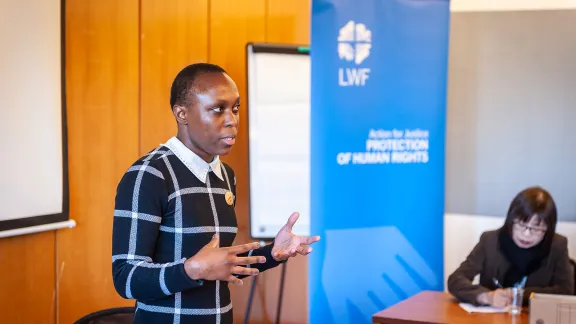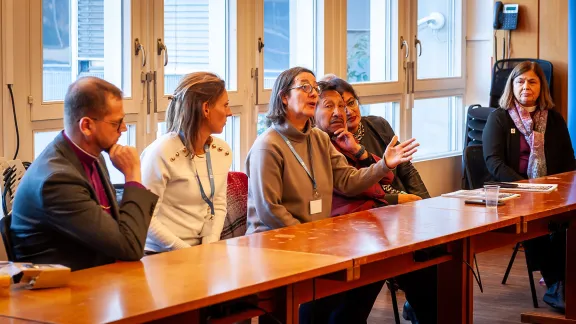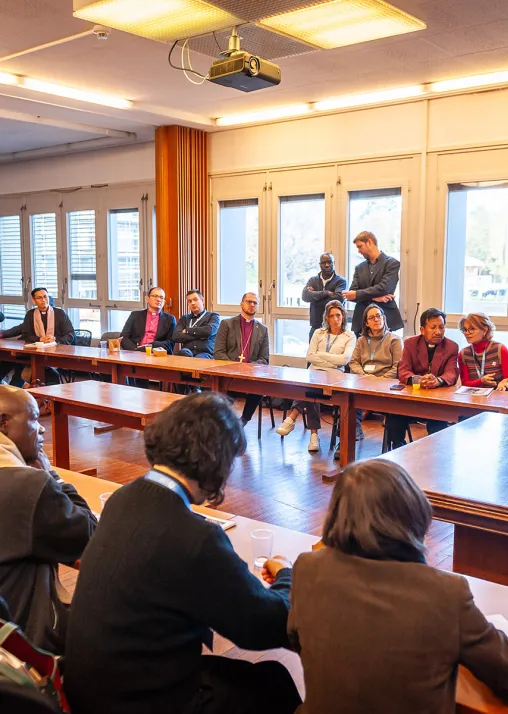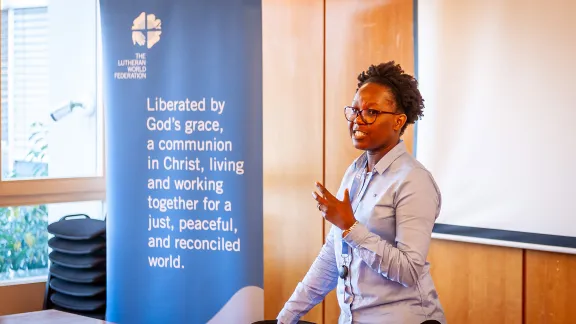UN representative underlines critical role of faith communities in the global fight against sexual and gender-based violence, and Lutheran church leaders share their churches’ response.

Ms Sarah Nanjala, UN Women’s Geneva Office, addressing participants at the LWF Communion Office event. Photo: LWF/S. Gallay
UN official underlines faith communities as “key partners” in breaking “taboo” of gender-based violence
(LWI) - A United Nations (UN) representative has emphasized the critical role of churches and other faith-based organizations (FBOs) in raising awareness about sexual and gender-based violence ahead of LWF’s engagement in the global 16 Days of Activism against Gender-Based Violence.
Faith-based organizations “have a very strong grassroot community, influence, integrity and they are more trusted,” said Ms Sarah Nanjala, from the UN Women’s Geneva Office. She was addressing participants in an event at The Lutheran World Federation (LWF) Communion Office, 22 November. Participants included LWF staff and 14 Bishops and Presidents of LWF’s member churches attending this year’s Retreat of Newly Elected Leaders. Nanjala referred to faith communities as “key partners” in UN trainings to raise awareness about “breaking the taboo” of gender-based violence in places where it “has become such a norm, that people think it is normal.”

Rev. Emmanuelle Seyboldt (third from the right), President of the United Protestant Church of France, talks about her church’s initiatives in the fight against gender and sexual-based violence. Photo: LWF/S. Gallay
Some of the church leaders shared how their churches are responding. Rev. Emmanuelle Seyboldt, President of the United Protestant Church of France said in the last three years, a hotline has been set up in all parishes for people to seek assistance, and booklets are available explaining gender-based violence and the punishment for such a crime. In India, the Northern Evangelical Lutheran Church has been working for 15 years to rehabilitate and offer alternative livelihoods to women sex workers in Mumbai city, said Bishop Isilash Basumatary.
Ms Sikhonzile Ndlovu, LWF Senior Advocacy Officer for Gender Justice highlighted global UN statistics to explain the importance of churches’ engagement. “On average, more than five women or girls are killed every hour by someone in their family, 736 million women and girls have been subjected to physical or sexual violence, and in 2021 alone over 45,000 women and girls were killed by a family member.”
During the 25 November to 10 December campaign, the LWF will share stories and resources on its online platforms, as well as initiatives from its member churches and country programs that focus on ending violence against women and girls. This year’s campaign takes place just two months on from the Thirteenth Assembly in Kraków, Poland, and the launch of a new Gender Justice Toolbox, as well as ten years on from the adoption of the LWF’s Gender Justice Policy.

Participants included LWF staff and 14 Bishops and Presidents of LWF’s member churches attending this year’s Retreat of Newly Elected Leaders. Photo: LWF/S. Gallay
On 28 November, LWF will host an online workshop to discuss best practices in preventing gender-based violence, while on 7 December, there will be a webinar reflecting on the 10th anniversary of the Gender Justice Policy, a key document that has shaped LWF’s engagement on gender justice and women’s empowerment.
Other initiatives include a webinar with partners in a Faith Actors Consortium on Gender-Based Violence, featuring the work of LWF in Uganda, and an online event on 11 December focusing on LWF’s human rights work in the context of the 75th anniversary of the Universal Declaration of Human Rights.

Ms Sikhonzile Ndlovu, LWF Senior Advocacy Officer for Gender Justice. Photo: LWF/S. Gallay
Find further details of these events, together with links to all our online resources


